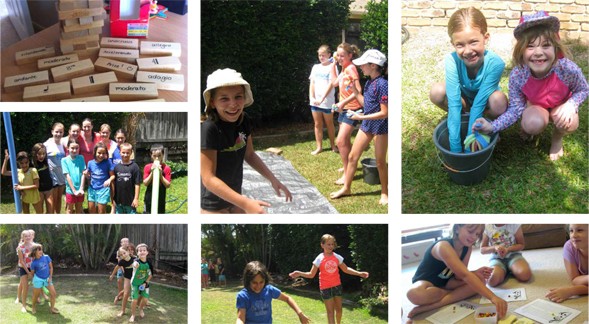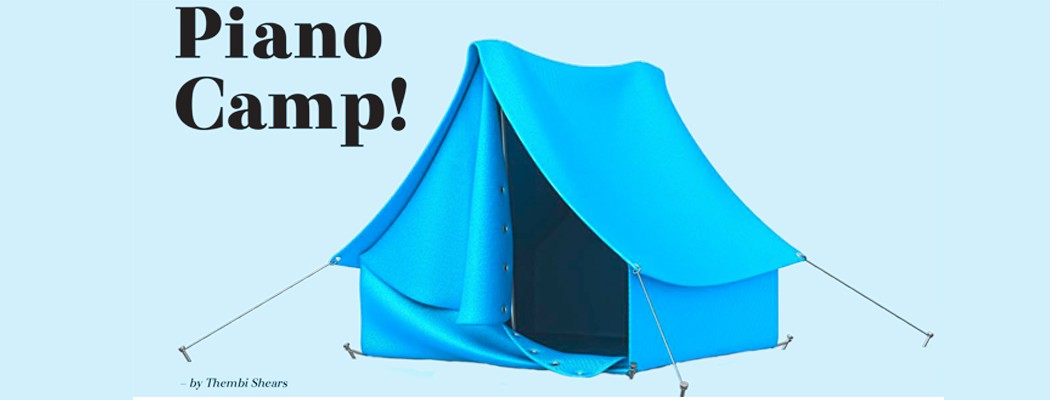Two years ago I was reading through piano teaching blogs while some students were away, and I came across posts about Music Camps that a couple of teachers in the US were running. I have trouble scheduling group lessons, due to very busy students, so I immediately thought this would be a great idea to get my students together in the holidays and do some group activities. I have now held one Winter Camp and one Summer Camp, and my students have named them their favourite musical moments of the year!
Why run a Piano Camp?
I have 3 main reasons for running my camps:
- Financial
I don’t teach individual lessons over the school holidays as I believe students need this unscheduled time, and I personally like the break to recharge and get organised for the next term. Running a camp brings in a considerable amount of extra income over a period where I usually wouldn’t be earning. It’s a large amount of planning but a lot of fun to run and an enjoyable change of pace from individual lessons.
- Student learning and engagement
I love getting students to work in groups; I think they learn a lot through games and activities that we just don’t get time for in individual lessons. It also saves me having to repeat the same content in 20 individual lessons! My students all love the activities and are far more engaged than they would be if I was drilling the concepts with flashcards or theory pages.
- A sense of community
I have worked really consciously over the last few years to create a sense of community in my studio. I have ‘Piano Parties’ for the older students to get to know each other and make friends, I run camps for them to get to learn together, and I run a new whole studio challenge each year that has everyone involved. Learning piano can be an isolating activity – it requires a lot of practice time and there aren’t many opportunities for ensemble playing in schools like there are with other instruments. Playing for each other and working together allows them to feel like part of a group, and I know they take inspiration and motivation from each other. It also means that when they perform at concerts or sit exams they get to catch up with each other and the whole experience is more fun and social.

How do you organise a camp?
I run my camps in age groups, with flexibility to bump up students if they are far beyond the level of other students their age. I have 3 groups: Beginner (5-7s), Intermediate (8-12s) and Advanced (13+). I have run camps in two different ways, both with positive and negative aspects, so you should choose the schedule that works for you.
Option 1: Have each group come for 2 hours a day over 5 consecutive days.
- g. Beginners 10am – 12, Intermediate 1pm – 3, Advanced 4pm – 6.
Option 2: Have each group come for whole days (9am – 3pm) for a set number of consecutive days.
e.g. Beginner Camp 2 days, Intermediate Camp 3 days, Advanced Camp 3 days.
I have found the second option means more students are able to come, as the schedule is more manageable for working parents.
I only offer my camps to current students of mine, as that allows me to tailor the activities to the abilities of children that I know, and I am familiar with their behaviours as well. Holding an open-to-all music camp could be a great option though, if you are just starting up a studio in a new area or are looking for a way to draw in new students.
What do you do on camp?
I spend months looking at teaching blogs and making note of group games and activities that I think would work on camp. I do this on my non-teaching mornings, and keep them saved in a folder on my laptop so that I can easily find them when I get to actually planning out my camp days. There are some wonderful websites with downloadable resources, you just need to spend a bit of time looking. This summer I ran a lot of outdoor games that were water based (sponges, water pistols, sprinklers) because the kids love to get outside and get messy, and it tired them out for the rest of the day’s indoor activities!
I also look through activities that I used as a classroom teacher and modify them to relate to piano. Youth group and party games can often work too. If you have old board games lying around, have a think about what you could do to incorporate some music concepts! My older students do a lot of listening activities, such as watching YouTube clips of performances to inspire and motivate them (I created worksheets with questions based on each performance), and learning about the periods of musical history, looking at the scores and listening to performances of pieces to understand the styles. I use activities that cover rhythm, performance, composition, improvisation, general knowledge, aural, music appreciation / inspiration, and theory.
Tips for running a camp
- Market your camp well in advance. Give parents the dates and costs, tell your students and get them excited about it, give parents a brief explanation of the benefits for their children, and set a deadline for registration. Send further reminders closer to the time.
- Limit your numbers to around 10 per group. Most games work best in groups of 4 or 5 as children get impatient waiting for their turn, so I pay one of my senior students to help me run the camps and we split them into two groups and rotate through activities.
- Be organised. Have everything ready at the start of each day, and know where everything is that you need to use. They can get very noisy and disruptive if they have to wait for you to set something up.
- Over-plan. Young students will go through some activities really quickly, when you thought it would take them ages, whereas other activities they’ll love and want to replay again and again. You don’t want to be caught with nothing to do so I would recommend planning more than you think you’ll get through. You can always use it next time!
- Have fun! The kids loved it this summer when my student helper and I joined in the outdoor water games and got soaked. Have rules but don’t be afraid of joining in and being silly, it’s a lot more fun that way.
